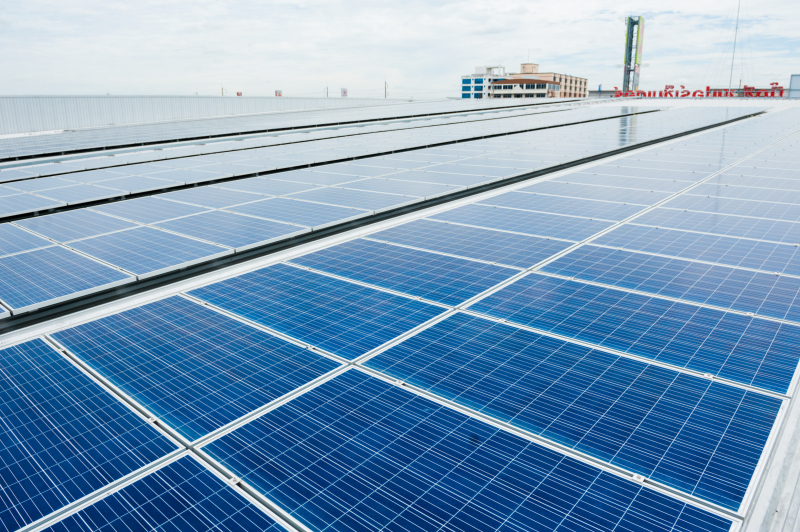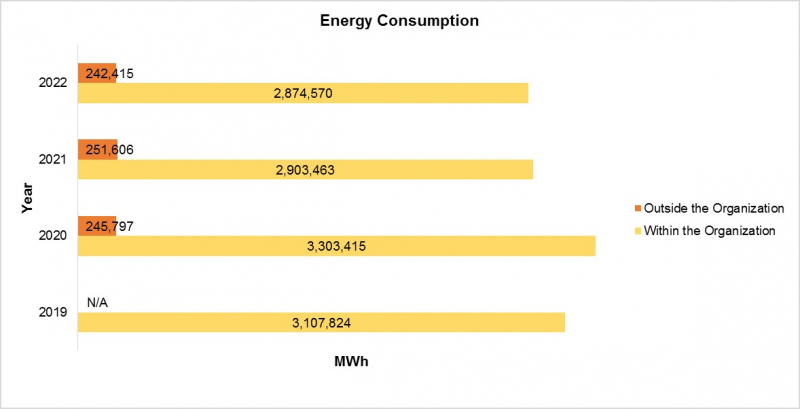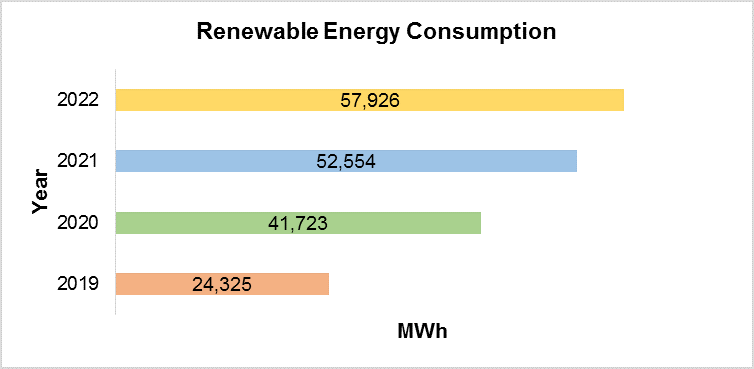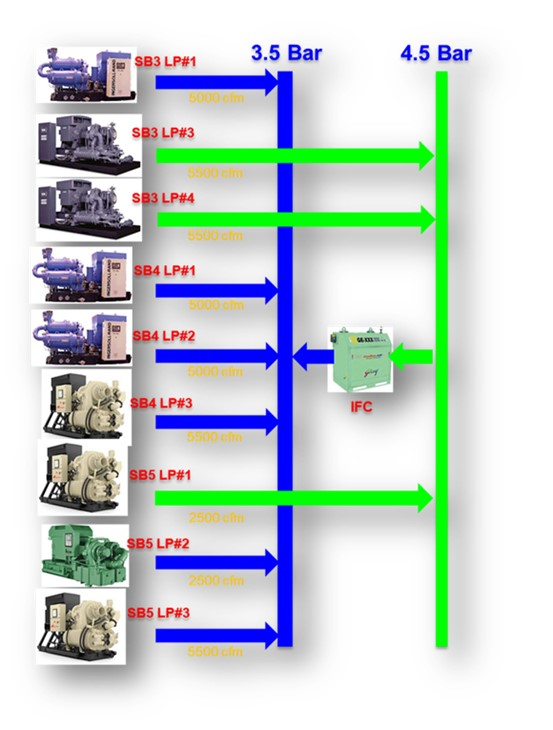
test

2 End hunger, achieve food security and improved nutrition and promote sustainable agriculture

goal 3

goal 4

goal 5

goal 6

goal 7

goal 8

goal 9

goal 10

goal 11

goal 12

goal 13

goal 14

goal 15

Goal 16
16.3: Promote the rules of law and the national and international levels and ensure equal access to justice for all.
16.5: Substantially reduce corruption and bribery in all their forms
16.7 Ensure responsive, inclusive, participatory and representative decision-making at all levels
16.b: Promote and enforce non-discriminatory laws and policies for sustainable development

Goal 17
ENERGY MANAGEMENT
Long Term Target: In 2032 reduce 15% of non-renewable energy per revenue from base year (2021)
As a consequence of continued economic growth and development, energy demands continue to grow, resulting in the continued and increase emissions of environmental damaging greenhouse gas emissions (GHG), contributing to climate change and a series of devastating environmental and social consequences to the planet, impacting operations through increase operating expenses, as natural resources are impacted from environmental impacts. For this reason, effective energy management is required to appropriately manage operational energy generation and consumption, to minimize negative environmental and social impacts. In addition, effective energy management also safeguards BJC's operations against potential environmental violations, allowing BJC to continue being ‘Your Trusted Partner for a Sustainable Better Living’.

BJC recognizes the importance of energy management which directly affects the cost of the company and the impact to environment. Therefore, BJC has included energy management in the group-wide environmental policy with a focus on energy efficiency and the use of clean and renewable energy. Each business unit has set a policy and procedure to manage and conserve energy in accordance with their business environment. For example, retail business groups have set up an energy conservation policy and communicate it to every store to follow, aiming to achieve energy efficiency and maximum benefit. To enforce this,
Moreover, energy management has also been integrated into relevant executive compensation, which is integrated into their respective remunerations compensation metrics. the executives is acocuntable for reducing non-renewable energy per revenue from base year by 15% by 2032 which has a clear indication that the performance on the provided material issues.
Moreover, BJC also expects our suppliers to have proper energy management. Thus, BJC has included energy management as a part of Supplier Code of Conduct and comunicate it to suppliers. Energy management is also one of the most important topics in BJC's supplier risk assessments.
Energy Consumption
Since 2020, BJC is committed to reducing overall energy consumption and to increasing the use of clean or renewable energy to minimize the negative impact on the environment. As a result, the energy consumption figures are shown in the table below;
|
Total Energy Consumption (MWh) |
FY2019 |
FY2020 |
FY2021 |
FY2022 |
Target for FY2022 |
|
 |
Total Energy Consumption |
3,107,824 |
3,303,415 |
2,903,463 |
2,874,570 |
|
|
|
Total Non-Renewable Energy Consumption |
3,083,499 |
3,261,692 |
2,850,909 |
2,816,644 |
2,822,399 |
|
|
Total Renewable Energy Consumption |
24,325 |
41,723 |
52,554 |
57,926 |
|
|
Data coverage (as % of denominator) |
87.69 |
87.58 |
89.98 |
91.37 |
|
|


Energy consumption by unit operations

|
Energy consumption (MWh per operation) |
FY2019 | FY2020 | FY2021 | FY2022 |
|
2,641 |
2,250 |
1,886 |
1,728 |
Highlight Activities
BJC has various projects to improve energy management, reduce energy consumption and increase the use of clean or renewable energy. The highlight projects include installation of energy saving equipment project, solar roof project and installation of freezer doors to reduce energy consumption project.
TMG - Reduce Operating Pressure (FPS)
Thai Malaya glass joint the innovative IoT production system prototype development by Department of Industrial Works for implement IoT technology for real time monitor and reduce operation pressure. The project is successful and practical in 2021, reducing energy consumption in 2021 (Jul-Dec) by 1,130,132 kWh and helping the company save 3.48 MB in costs.
TMG - Reduce Operating Pressure (FPS)
Thai Malaya glass joint the innovative IoT production system prototype development by Department of Industrial Works for implement IoT technology for real time monitor and reduce operation pressure. The project is successful and practical in 2021, reducing energy consumption in 2021 (Jul-Dec) by 1,130,132 kWh and helping the company save 3.48 MB in costs.
 |
 |
Solar Roof Project by Big C
As a continuation form 2020, the ‘Big C Solar Roof Project’ is a collaboration between Big C and Sharp Corporation through Impact Solar Limited, under the Bilateral Cooperation Project, which aims to install solar cell panels on building roof tops to generate electricity for onsite consumption. This reduced electricity consumption from the grid, which are generated from fossil fuels, such as coal and natural gas.
This ongoing effort has been reducing BJC’s Scope 2 GHG emissions. In 2020, the project installed solar cell panels at 5 additional Big C branches, increasing the total number of branch installed to 37, equivalent to 4.22% of current energy consumption, which translated to 20,174 metric tons of CO2 equivalent GHG emissions saved per year.
‘Solar Roof Project’ By Big C
As a continuation form 2020, the ‘Big C Solar Roof Project’ is a collaboration between Big C and Sharp Corporation through Impact Solar Limited, under the Bilateral Cooperation Project, which aims to install solar cell panels on building roof tops to generate electricity for onsite consumption. This reduced electricity consumption from the grid, which are generated from fossil fuels, such as coal and natural gas.

This ongoing effort has been reducing BJC’s Scope 2 GHG emissions. In 2020, the project installed solar cell panels at 5 additional Big C branches, increasing the total number of branch installed to 37, equivalent to 4.22% of current energy consumption, which translated to 20,174 metric tons of CO2 equivalent GHG emissions saved per year.
|
Year |
2017 |
2018 |
2019 |
2020 |
|
Number of Branch Installed |
0 |
6 |
32 |
37 |
|
kWh/year of Solar Energy Generated |
0 |
1,295,414 |
23,562,703 |
40,355,599 |
Awards
Ecofriendly Technologies Development at TGI and TMG
Thai Glass Industries PLC (TGI) and Thai Malaya Glass Co, Ltd (TMG) are registered with the Thailand Voluntary Emissions Reduction Program (T-VER), committed to reduce GHG Emissions from operations through the utilization of low carbon technologies.
In 2020, both TGI and TMG registered the Solar Roof Projects, which is expected to finished installation in 2021, under the T-VER program. The Solar Roofs are estimated to produce 4,012,125 kWh per years for TGI, reducing a total of 2,272 tons of CO2 per year, and 1,339,360 kWh for TMG, equivalent to a reduction of 660.97 tons of CO2 per year.
Ecofriendly Technologies Development at TGI and TMG

Thai Glass Industries PLC (TGI) and Thai Malaya Glass Co, Ltd (TMG) are registered with the Thailand Voluntary Emissions Reduction Program (T-VER), committed to reduce GHG Emissions from operations through the utilization of low carbon technologies.

In 2020, both TGI and TMG registered the Solar Roof Projects, which is expected to finished installation in 2021, under the T-VER program. The Solar Roofs are estimated to produce 4,012,125 kWh per years for TGI, reducing a total of 2,272 tons of CO2 per year, and 1,339,360 kWh for TMG, equivalent to a reduction of 660.97 tons of CO2 per year.

